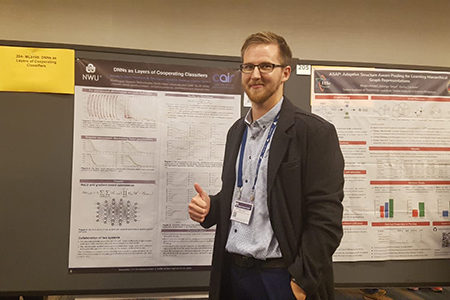“The amount of interest has come as something of a surprise,” says Prof Marelie Davel, who – with PhD student Tian Theunissen – recently travelled to New York, USA, to present their latest findings at the highly regarded conference of the Association for the Advancement of Artificial Intelligence (AAAI), AAAI-2020. This annual event is one of the flagship conferences of the AI community and attracts thousands of researchers from across the globe.
According to Prof Davel, the results presented form part of a series of papers currently being produced by MuST, a research group that studies machine learning at the NWU’s Faculty of Engineering.
Together with Prof Etienne Barnard and their postgraduate students, she works on both the theory and applications of machine learning, and especially of deep learning. These are learning methods that utilise artificial neural networks to create complex, layered models of the world, and are behind many of the recent successes in AI.
Even though these techniques have been shown to be very successful in practice, they are difficult to analyse and understand. Design choices are based on heuristics rather than solid theory, often resulting in researchers having to create hundreds of thousands of networks in the search for a good model.
This is one of the main questions that MuST is now tackling: probing the ability of these networks to generalise, in other words, not only to memorise what they have been shown, but being able to predict what will happen in novel situations.
Sharing with international peers
The work presented at AAAI-2020 describes a new perspective for understanding and viewing the internal workings of a deep neural network. It was co-authored by Prof Davel, Prof Barnard and Tian, and a second student, Arnold Pretorius. Since presenting the latest paper, the group has received a steady stream of enquiries with regard to the published results.
All the co-authors agree that it was a privilege to be selected to present their work at AAAI-2020. This year, the conference received a record 8 800 submissions, of which 7 737 were full academic papers. The conference has a notoriously low acceptance rate (approximately 20% in 2020), with only 6% of papers selected for oral presentation.
The NWU paper was presented at both an oral and a poster session. Tian explains how he enjoyed the active engagement of conference goers: “At 21:30 on the Sunday night I was still answering questions from people who were interested in our poster. It is very encouraging to know that our international peers are just as curious about our work as we are.”
A number of famous researchers were speakers at the conference, including the 2019 Turing Award winners (Profs Geoffrey Hinton, Yann LeCun and Yoshua Bengio) and the Nobel Prize winner Daniel Kahneman.
The only let-down of the conference was the noticeable absence of about 800 Chinese delegates, who were, sadly, unable to travel to the conference due to concerns regarding the Covid-19 virus. They presented their papers via recorded video instead, or had their posters set up unattended.
Work that cuts across technical areas
Founded in 1979, the AAAI is an international, non-profit, scientific society devoted to promoting research in AI and fostering scientific exchange between researchers, practitioners, scientists, students and engineers in AI and its affiliated disciplines.
This year’s AAAI-2020 was the 34th AAAI conference and involved the presentation of technical papers, invited speakers, workshops, tutorials, poster sessions, senior member presentations, competitions and exhibit programmes, all selected according to the highest standards. AAAI-20 also included additional programmes for students and young researchers.
The AAAI-2020 conference welcomed submissions reporting research that advances AI, broadly conceived. The conference scope included all subareas of AI and machine learning. These included (but were not limited to) traditional topics such as search, planning, knowledge representation, reasoning, natural language processing, robotics and perception, multi-agent systems, statistical learning and deep learning. The conference encouraged work that cut across technical areas, or developed AI techniques in the context of important application domains such as healthcare, sustainability, transportation and commerce.
More about the experts
Prof Marelie Davel is a research professor at the NWU specialising in machine learning, and specifically in deep learning. She holds a PhD in electronic engineering from the University of Pretoria. Prior to joining the NWU, she was a principal researcher at the South African Council for Scientific and Industrial Research.
Prof Davel performs independent research, supervises postgraduate students and consults for clients from the government and industry. She is the director of the MuST research group, the Centre for AI Research (CAIR) group coordinator at the NWU, and an NRF-rated researcher. Her current research focuses on generalisation in deep learning.
Prof Etienne Barnard holds a PhD degree in electrical and computer engineering from Carnegie Mellon University, and has been active in research and development in pattern recognition and speech processing for many years. He has held a number of academic and industry positions, holds international patents in speech processing, and is a past associate editor of the IEEE Transactions on Neural Networks.
Prof Barnard’s research contributions have been recognised in various ways, including with Google Research awards in 2009, 2011 and 2014. He is currently an extraordinary professor at the NWU.
PhD student Tian Theunissen recently travelled to New York to present their latest findings at the highly regarded conference of the Association for the Advancement of Artificial Intelligence.
